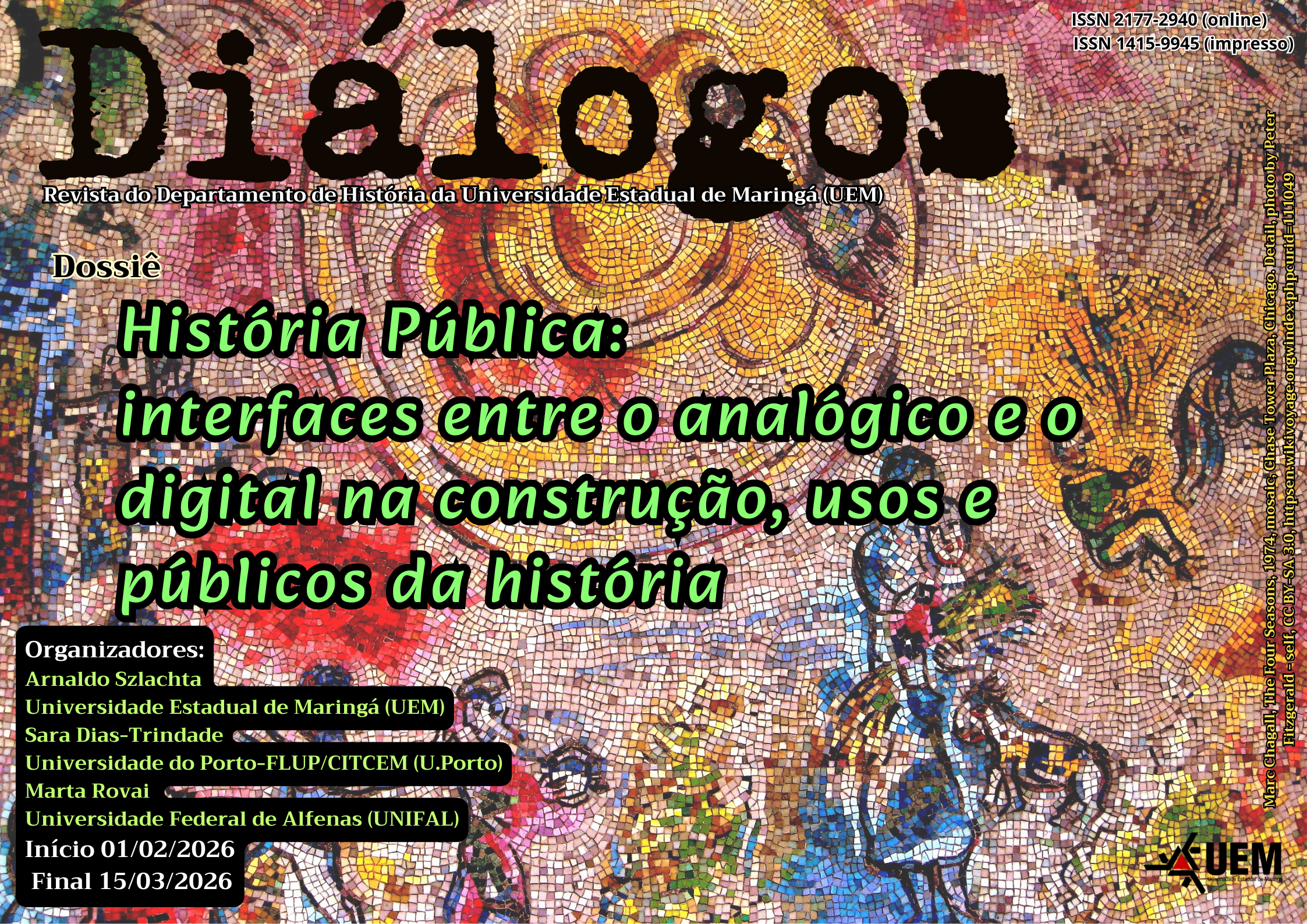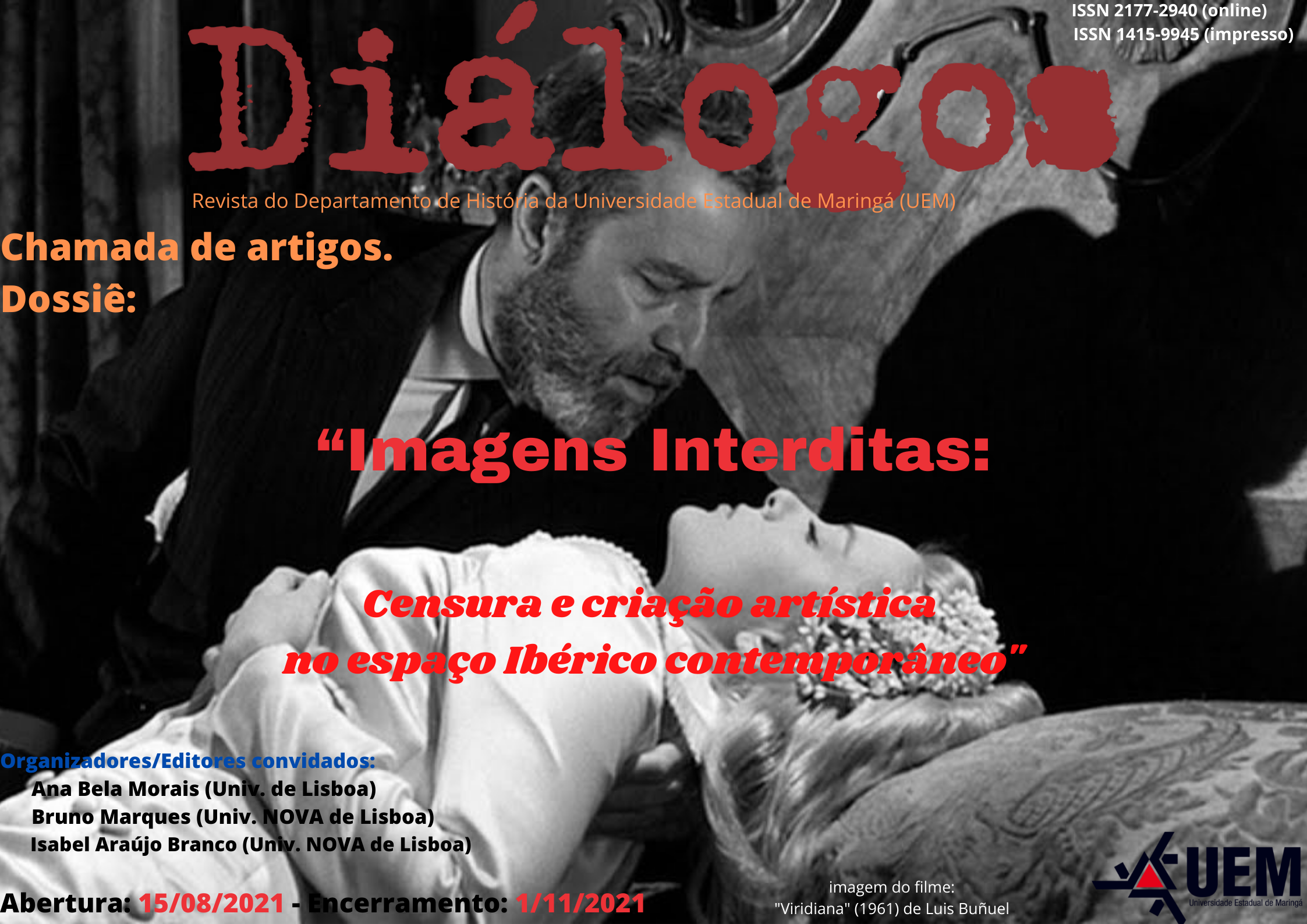História Pública: interfaces entre o analógico e o digital na construção, usos e públicos da história

A revista DIÁLOGOS do Departamento e do Programa de Pós-Graduação em História da Universidade Estadual de Maringá (UEM) convida a todos os pesquisadores interessados a submeterem artigos inéditos para o seu dossiê História Pública: interfaces entre o analógico e o digital na construção, usos e públicos da história.
Em um cenário marcado pela intensificação das tecnologias de comunicação, pela circulação acelerada de narrativas e pelo papel central das plataformas digitais na constituição da cultura histórica contemporânea, torna-se fundamental refletir sobre as interfaces entre ambientes analógicos e digitais. As práticas historiográficas não se deslocaram integralmente para o espaço virtual, mas passaram a operar em um regime híbrido, no qual documentos, memórias, linguagens, suportes e públicos se entrecruzam.
O objetivo é selecionar e publicar textos que contribuam para a compreensão das relações entre historiografia, mediação cultural, usos públicos do passado e tecnologias, ressaltando a necessidade de repensar os modos de participação social, de engajamento comunitário e de circulação pública da história. Oferecer um espaço de reflexão crítica e interdisciplinar que articule epistemologia, metodologia, mediações digitais e práticas sociais, aproximando debates sobre patrimônio, memória, ensino, acervos e produção de narrativas históricas em múltiplas plataformas.
A proposta é discutir como as transformações tecnológicas, a cultura digital e as novas modalidades de participação social têm impactado a escrita, a pesquisa e a circulação pública da história. Porém, embora o digital ocupe posição de destaque nas discussões contemporâneas, o dossiê enfatiza a permanência da dimensão analógica, fundamental para a produção do conhecimento histórico e para as práticas de História Pública. Arquivos físicos, documentos manuscritos, objetos, monumentos, espaços urbanos, performances de memória e interações presenciais continuam constituindo bases essenciais para a pesquisa e para a mediação com diferentes públicos. O analógico não é substituído pelo digital, mas atua como seu contraponto crítico, oferecendo materialidade, corporeidade e experiência sensível que nenhum ambiente virtual pode reproduzir integralmente. Ao valorizar práticas como visitas a arquivos, observação direta de acervos, trabalho de campo, ações comunitárias e encontros formativos presenciais, o dossiê propõe pensar a História Digital como um campo que se constrói em constante diálogo com as formas tradicionais de produção historiográfica e com a cultura material do passado. Desse modo, busca-se compreender como o hibridismo entre analógico e digital enriquece a escrita da história e amplia as possibilidades de participação pública nas narrativas históricas. A expansão das humanidades digitais, a disseminação de arquivos online, a produção colaborativa de conteúdos, as redes sociais, os podcasts, os vídeos e as plataformas de divulgação historiográfica colocam novos desafios à prática do historiador, exigindo novas competências de leitura, criação e mediação.
Interessa compreender de que modo o digital não substitui, mas dialoga com o analógico, criando zonas de intersecção que redefinem a relação entre fonte, narrativa e público. Pretende-se reunir artigos que analisem temas como:
-
mediações públicas do passado em ambientes virtuais e presenciais;
-
ações de História Pública que integrem acervos físicos e digitais;
-
curadoria de conteúdos históricos em redes sociais;
-
museus híbridos e processos de digitalização patrimonial;
-
metodologias digitais aplicadas à pesquisa histórica;
-
mapas interativos, banco de dados, humanidades espaciais e ferramentas de visualização;
-
implicações éticas, políticas e epistemológicas das tecnologias na construção da cultura histórica contemporânea.
O dossiê também recebe reflexões sobre a presença da inteligência artificial na produção historiográfica, questionando como algoritmos, modelos de linguagem e plataformas automatizadas influenciam a mediação do passado e a formação de públicos. Busca-se problematizar a autoria, os regimes de verdade, os processos de validação e a circulação de narrativas produzidas em ecossistemas algorítmicos.
Ao integrar contribuições teóricas e empíricas, nacionais e internacionais, pretende-se mapear novas fronteiras da História Pública e da História Digital, discutindo como historiadores têm atuado como mediadores entre memórias, comunidades e tecnologias. Mais que uma reflexão técnica, trata-se de um convite a repensar o papel social do historiador no século XXI, suas responsabilidades na esfera pública e as novas formas de escrita da história que emergem na articulação entre o analógico e o digital.
Organizadores:
Arnaldo Szlachta
Universidade Estadual de Maringá (UEM) Maringá-PR, BR
https://orcid.org/0000-0001-5839-8224
Sara Dias-Trindade
Universidade do Porto-FLUP/CITCEM (U.Porto). Porto-OPO, PT
https://orcid.org/0000-0002-5927-3957
Marta Rovai
Universidade Federal de Alfenas (UNIFAL). Alfenas-MG, BR
https://orcid.org/0000-0003-0769-0748
Período de submissão: 01 de fevereiro a 31 de março de 2026
Submissão dos artigos: As diretrizes para os autores e as normas para submissão e publicação encontram-se na página online da revista, que pode ser acessada pelos links abaixo. Pedimos gentilmente que leiam com atenção as seções antes de submeterem os textos.
https://periodicos.uem.br/ojs/index.php/Dialogos
http://periodicos.uem.br/ojs/index.php/Dialogos/about/submissions#authorGuidelines
Leggi di più al riguardo di História Pública: interfaces entre o analógico e o digital na construção, usos e públicos da história


 Apresentação
Apresentação.png)
.png)

.png)
.png)
 A revista DIÁLOGOS do Departamento de História e do Programa de Pós-Graduação em História da Universidade Estadual de Maringá (UEM) convida a todos os interessados a submeterem artigos inéditos para o seu dossiê “Imagens Interditas. Censura e criação artística no espaço ibérico contemporâneo”, a ser publicado no 1º quadrimestre de 2022. Pretende-se publicar textos de investigadores de diversas áreas do conhecimento que abordem o problema da censura às imagens tendo em consideração o contexto histórico e cultural dos países ibéricos. Serão privilegiadas abordagens interdisciplinares e atuais que se integrem nas principais questões científicas internacionais e em metodologias de trabalho inovadoras com resultados relevantes.
A revista DIÁLOGOS do Departamento de História e do Programa de Pós-Graduação em História da Universidade Estadual de Maringá (UEM) convida a todos os interessados a submeterem artigos inéditos para o seu dossiê “Imagens Interditas. Censura e criação artística no espaço ibérico contemporâneo”, a ser publicado no 1º quadrimestre de 2022. Pretende-se publicar textos de investigadores de diversas áreas do conhecimento que abordem o problema da censura às imagens tendo em consideração o contexto histórico e cultural dos países ibéricos. Serão privilegiadas abordagens interdisciplinares e atuais que se integrem nas principais questões científicas internacionais e em metodologias de trabalho inovadoras com resultados relevantes.












